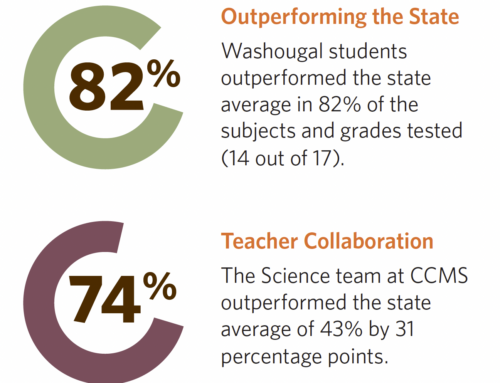Students are filling the classrooms, hallways, and playgrounds of Washougal schools after nearly a year away. However, approximately 200 students were already meeting in school buildings in small groups one to four days a week since September 2020 for personalized education.
“These learners needed specialized instruction that could not be offered effectively with distance learning,” said Penny Andrews, WSD Director of Special Education. “Some students had formal Individual Education Plans (IEP), while others either were not able to connect to the internet or not successfully learn online. Our staff worked hard to bring in as many students as possible to support them with their learning goals, their assignments and even some tutoring thrown in there.”
Noah Dentler, a six-grade student at Canyon Creek Middle School, is an example of the significant progress these students were able to make during the pandemic. “He is a student that has really blossomed in small groups with in-person-learning,” said CCMS teacher Katherine Baxter. “The small group offered him a lot of one-on-one support. Now that we are in hybrid, he is flourishing. He is loving school and has a great attitude. He is more focused than he was at the beginning of the year.”
“It was hard with everything online,” Noah explained. “Now I feel more confident in my regular classes and I am working hard to keep up on all of my work.”
“The end of last year was rough… really rough, with the sudden move to online learning,” said his mother, Anni Dentler. “It was so stressful for him that I took him out of the school. The start of this year was also difficult, with the change to a middle school schedule with more teachers teaching different subjects.” But thanks to the improved communication between parents and teachers, development of a plan and small group instruction, Noah is doing much better now.
“Noah started out in the small groups as quiet and shy,” said Baxter. “He would appear alert, focused and on task, but he was struggling and never let anyone know. His missing work was growing, but now we have a plan in place to work with the paras that helped him get caught up and keep him caught up.”
“He now only has five missing assignments,” said Anni Dentler. “And that is such an improvement. I’m proud of him.”
The small groups allowed Baxter and the para educators to really get to know the students like Noah. “With the first two hours of study hall and Asynch learning, we were able to see what they know and how they learn,” she explained. “The paras and I were able to see them in all their classes and how they focus and teach them how to start on assignments, to ask questions and advocate for themselves.”
With the move to hybrid learning, Noah and others continue the small group instruction two or three days a week as well as attend school on their regular days with peers. “This 1:1 teacher support is important to providing them a focus on their learning goals to prevent them from losing ground,” said Andrews. “We have also had an increase of communication with families as teachers develop support plans to meet the needs of each individual student and family.”
“The communications between me and Noah’s teachers have tremendously improved,” Anni Dentler said. “We have created a bond as we work together to help him.”
“Just the time of letting Noah know how much we all care for him and for him to be successful plus coaching from home, he began advocating for himself and asking clarifying questions,” Baxter said. “He has such a great support system at home that keeps us updated on things there or how he was doing.”
“We have a number of ways our teachers are working to support students with special needs or IEPs at this time,” said Andrews. Those supports include: joining students in their class Zoom sessions, zooming with them to offer tutoring on assignments and learning goals, advocating for more time in person when students were struggling, request home visits from school personnel when students struggle with attendance, holding group sessions for students to work on collaboration and social goals, helping students access their classroom zoom meetings and assignments while at school, helping students stay organized and working proactively with families to offer assistance.
“I am proud of our entire special education staff in Washougal,” said Andrews. “And by watching the work that Katherine is doing, and how she advocates for students, I can see she feels strongly that students do best when there is a human connection and when the students know that they have an adult who is cheering them on and supporting them.”
“It is nice to see a child come out of their shell and go out of their way to learn all they can and to be successful,” said Baxter. “Noah is that student. He is a hard worker and has managed to persevere through this time to stay on track.”




